2013春仁爱英语八年级下册语法知识点
春仁爱英语八年级下册语法知识点
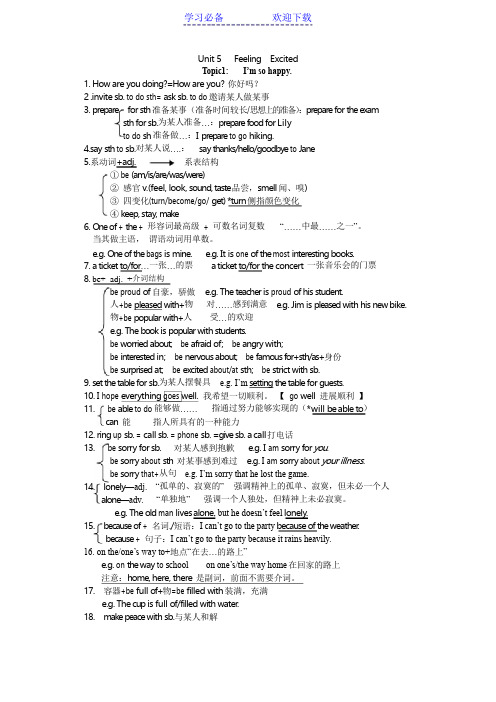
Unit5Feeling ExcitedTopic1:I’m so happy.1.How are you doing?=How are you?你好吗?2.invite sb.to do sth=ask sb.to do邀请某人做某事3.prep are for sth准备某事(准备时间较长/思想上的准备):pr epare for the examsth for sb.为某人准备…:prepare food for Lilyto do sh准备做…:I prepare to go hiking.4.say sth to sb.对某人说….:say thanks/hello/goodbye to Jane5.系动词+adj.系表结构①be(am/is/are/was/were)②感官v.(feel,look,sound,taste品尝,smell闻、嗅)③四变化(turn/become/go/get)*turn侧指颜色变化④keep,stay,mak e6.O ne of+the+形容词最高级+可数名词复数“……中最……之一”。
当其做主语,谓语动词用单数。
e.g.On e of the bags is mine. e.g.It is one of the most interesting books.7.a ticket to/for…一张…的票a ticket to/for the concert一张音乐会的门票8.be+adj.+介词结构be proud of自豪,骄傲 e.g.The teacher is proud of his student.人+be pleased with+物对……感到满意 e.g.Jim is pleased with his new bike.物+be popular with+人受…的欢迎e.g.The b ook is popular with students.be worried about;be afraid of;be angry with;be interested in;be nervous about;be famous for+sth/as+身份be surprised at;be excited about/at sth;be strict with sb.9.set the table for sb.为某人摆餐具 e.g.I’m setting the table for guests.10.I hope everything goes well.我希望一切顺利。
仁爱版八年级下英语语法归纳

E n g l i s h 语法归纳(初二下)BY {cy2.}Unit 5 Topic 1 Section A 系动词+adj. 构成系表结构。
Invite sb. /to do sth. 邀请某人做某事。
邀请某人做某事。
邀请某人做某事。
Invite sb. \+地点地点 邀请某人去某地。
邀请某人去某地。
Prepare Prepare……for for……=get ready for … 为……准备。
为……准备。
Say thanks to sb. 向某人道谢。
向某人道谢。
Section B A ticket to\for ………的票。
……的票。
Be able to do sth … 有能力做某事。
有能力做某事。
=can 。
但是can 一般用于现在时和过去时 而be able to 可以用于任何时态。
Ring sb. up 打电话给某人。
打电话给某人。
打电话给某人。
Be proud of 以……骄傲。
以……骄傲。
以……骄傲。
Be pleased with … 对……满意。
对……满意。
Section C Care about 关心关心Care+从句省略about Get married to sb.= marry sb. 与某人结婚。
与某人结婚。
关于花费:Sth. Cost sb.+钱Sb. spend+时\钱 in 、on sth.\doing sth. It take sb\时 to do sth. Sb.pay 钱 for sth. Be on 上映。
上映。
Cheer up 使……振作。
使……振作。
What What……for=why 。
(口语)(口语)To+动词不定式。
同级比较特殊疑问词+不定式。
(what to do\how to do it)原因状语从句。
引导原因状语从句的常用连词是what。
用于回答why引导的问句。
结果状语从句So…that…引导的结果状语从句。
So+adj.+从句。
完整word版,仁爱版八年级英语下册语言知识点归纳

八年级英语(仁爱版)下册语言知识点归纳kind cruel popular unpopular我最喜欢的电影之一 过夜 向某人道谢 / 道别 / 问好 讲一个小故事 一张…的票 希望做某事 得到足够的睡眠 获得一枚奖牌 感到自豪 / 孤单 为……摆餐具 发烧有能力做某事 给……打电话 照顾 由于使……振奋、高兴起来 /为 ……喝彩、加油 扮演某人的角色 上演 ; 放映首先 落入 害怕做某事 最后 发疯 形成 充满… 受……喜爱制造和平 以……结尾 /开始What a shame! 真可惜! = That ' s too bad! What bad news! 多糟的消息 !这三句全都是感叹句 . 它们的结构为 :1) H ow + adj./ adv. + 主语 + 谓语 ! 如 : How moving the movie is! How fast the boy runs! 2) W hat + a/an + adj. + n. ( 可数名词的单数 ) + 主语 + 谓语! 如: What a big apple (it is)! 3) W hat + adj. + n.( 可数名词的复数或不可数名词 ) + 主语 + 谓语! 如:What hard work( it is)!The Sound of Music. 因为他没有买到《音乐之声》的票 to 表“的”,常见的搭配如下:a ticket to The Sound of Music 一张《音乐之声》的票 the answer to the question 问题的答案 the key to the door 门的钥匙 the way to …去…的路 3.I think Mr. Lee likes it very much and reallywishes to watch it.我认为李老师非常喜欢它而且的确想去看 . wish/ hope to do sth. 希望做某事与 wish 相关的结构还有 : wish/ hope + that 引导的从句 ; 如 :I wish/ hope (that) we will win.我们可以说 wish sb. to do sth. 而不能说 hope sb. to do sth.;4. I 'll ring up Michael later.稍后我打电话给迈克 .ring up sb. = call/ ring/ phone sb. = give sb. a ring/ call/ telephone = make a telephone to sb.当宾语为代词时 , 只能放中间 . 如: ring me/him/her up5. … since they were not able to go. ……既然他们不能去 .can 与 be able to 二者都表“能;会”,在指“一般能力”时,常互换。
【知识点】仁爱英语八年级下册知识点语法
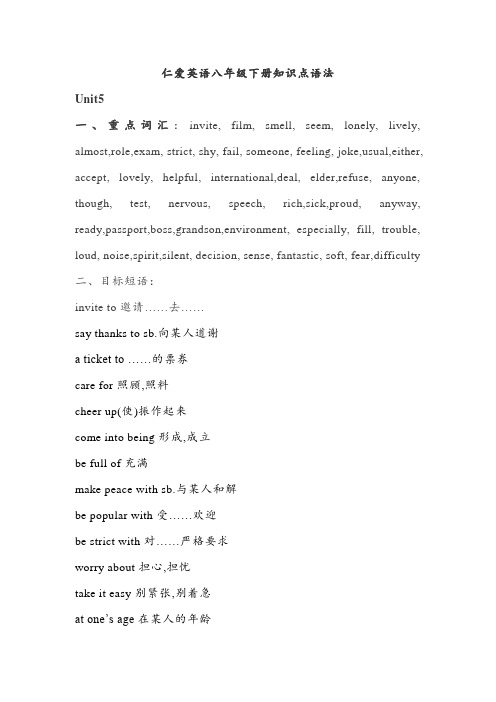
仁爱英语八年级下册知识点语法Unit5一、重点词汇:invite, film, smell, seem, lonely, lively, almost,role,exam, strict, shy, fail, someone, feeling, joke,usual,either, accept, lovely, helpful, international,deal, elder,refuse, anyone, though, test, nervous, speech, rich,sick,proud, anyway, ready,passport,boss,grandson,environment, especially, fill, trouble, loud, noise,spirit,silent, decision, sense, fantastic, soft, fear,difficulty 二、目标短语:invite to 邀请……去……say thanks to sb.向某人道谢a ticket to ……的票券care for 照顾,照料cheer up(使)振作起来come into being 形成,成立be full of 充满make peace with sb.与某人和解be popular with 受……欢迎be strict with 对……严格要求worry about 担心,担忧take it easy 别紧张,别着急at one’s age在某人的年龄tell jokes 讲笑话with the help of 在……帮助下be/ get used to (doing)sth.习惯于(做)某事all the time 总是,一直deal with 处理,解决even though 即使,尽管no longer/ not any longer 不再give a speech 发表演讲be in a bad mood 情绪不好be proud of 以……自豪give sb. a surprise 给某人一个惊喜get ready for 为……做准备fill with(使)装满,充满be crowded with 挤满think over 仔细考虑make a decision做决定三、重点句型1.—How are you doing?—Very well, thank you.2. You look excited.3.—He felt disappointed because he was not able tobuy a ticket to The Sound of Music.—What a pity!4. He seems a little unhappy.5. It’s so funny and interesting.6. We felt excited to hear it.7.In China it used to be popular with old people while young people didn’t like it very much.8. What seems to be the problem?9.She feels very lonely because she has no friends to talk with.10. Why don’tyou talk to someone when you feel sad?11. Everyone gets these feelings at your age.12. How time flies!13. What’s more, I couldn’t sleep as well as usual.14. The food was not as delicious as ours,either.15. Please give my best wishes to your parents.16. Is there anything wrong?17. You see a snake lying on the road.18.Think it over before making an important decision.四、功能意念句型1.高兴I’m so happy!That’s lovely/ great/ very exciting/ wonderful! How wonderful/ nice!It’s well done. I’mpleased to know that.2.惊奇Really?Oh dear!Is that so?What a surprise!How nice to see you!How surprising!I’m surprised!Does thatWha t’s wrong?What’sthe matter?Anything wrong?What should we do?Are you worried about your health?I’m worried.4.安慰There, there.Don’t be afraid.Don’ t worry.It’s(quite) all right.It’ll be OK/ all right.Take it easy.5.满意Wow! Sounds great!Good!Well done!It’s so exciting.Perfect!That’s fine.That’s better.That’s good enough.I’m pleased with your spoken English.6.遗憾What a pity!I’m so sorry!It’s a great pity!What a shame!That’s too bad.7.同情I’m so sorry!I’m sorry to hear that.I’m so sorr y about your illness.I’m sorry to hear you are going away.Please accept my deep sympathy.8.恐惧Help!How terrible!I’m afraid of that dog.I’m frightened.I’m afraid of taking bitter medicine.五、语法项目1.系动词+形容词结构。2.由because引导的原因状语从句。3.形容词的同级比较(as... as... , not as/ so... as...)。4.简单句的六种基本句型。Unit6一、重点词汇:field, proper, price, total, pay, hotel, fridge,standard, single, condition, comfortable, raise,king,queen, common, Canadian, dollar, somebody, top,receive, postcard, vacation, camp, north, east,west,wait, bicycle, tour, space, push, direction, step,beside, experience, everywhere, passenger, crazy,anywhere, pollution, advantage, careless, safety,truck, notice, empty, Asia, among, France, mile,central, winner explain, Europe, French, town,village, slow, opposite, rush二、目标短语spring field trip 春游find out 发现,查明decide on sth.对某事做出决定air conditioner 空调a standard room with one single bed 单人标准间raise money 筹钱look forward to(doing) sth.期望(做)某事hear from 收到……来信prepare for 准备on vacation 度假work out 算出,制定,完成in all directions 向四面八方push out 推开,挤出as soon as 一……就……be famous for 以……著名can’t help doing禁不住做be/ get used to 习惯于……agree/ disagree with sb.同意(不同意)某人的观点pay attention to 注意in case of 如果,假使look out 小心三、重点句型:1.Boys and girls, I have some exciting news to tell you!2.We’re going on a three⁃day visit to Mount Tai.3. What do you think your trip will be like?4.It is very common to raise money in Canadian and American schools.5.I’m looking forward to hearing from you.6. The best way to raise money is to sell newspapers.7.Why don’t we put on a show to raise money?8.While you were enjoying your trip, I was busy preparing for my exams.9. It’s about one and a half hours by bike.10.He was too worried to think about what to do.11.He didn’t raise his head until someo ne called him.12.While we were having fun exploring, I found that Darren was lost.13.When I first arrived,I was afraid of riding my bike anywhere.14. If we break the traffic rules, we may get a fine and even be in danger.15.In case of an accident, bicycle riders should know how to give first aid.六、功能意念句型提醒注意Don’t forget your raincoat.Remember to lock the door.Mind your head/ step!No smoking!No spitting!Wet floor!Look out!Be careful!It’s dangerous!Don’t touch!Don’t push!No photos here!五、语法项目.动词不定式作定语、表语、宾语、宾语补足语、目的状语和主语等。2.由while,after, before, as, when, until 和as soon as 引导的时间状语从句。3. if 引导的条件状语从句。Unit7一、核心词汇task, touch, success, imagine, soup, cookie, pancake,set, blind, western, Indian, African, Russian, address,regret, group, member, purpose, oil, add, noodle, bowl,quick, pear, piece, polite, fork, dish, spoon, chopstick,finger, southern, pick, lady, gentleman, sale, guest,menu, bill, corn, salad, lemon, bean, carrot, seat, job,worth, education, develop二、目标短语turn to sb.向某人求助get in touch with(与……)取得联系try one's best 尽最大努力set the table 摆放餐具have a sweet tooth 爱吃甜食fight against 反抗,和……打架as a result 结果make a change 改变in order to 为了come true 变为现实,成为事实cut up 切碎,剁碎table manners 餐桌礼仪drink to sb. / sth.为某人/ 某事干杯(或祝酒)far away from 远离pick up 捡起,获得,收拾for sale 待售pay the bill 结账have a seat 请坐in short 总之;简而言之not only…but also …不仅……而且……三、重点句型1.My task is to make a poster.2. I will think about how to hold the food festival.3. Let's try our best to make it a success.4. That's good enough.5. Thank you for inviting me to your food festival.6. I regret that I cannot come.7. But I'm not sure whether I can cook it well.8.—Would you like me to help you?—Yes, please.It's very kind of you.9.Could you tell us how to make it?10.—Would you mind if we learn to make itfrom you?—Of course not.11. Practice makes perfect.12. Help yourself to some soup.13. Remember not to drink too much.14.If you can't remember these rules, just do as other people do.15.—Do you know whether or not it's impolite to smoke during a meal in France?—Yes, I do.It's impolite.四、功能意念句型1.就餐(1)—Would you like something to eat/ drink?—Yes, I'd like some meat/ a cup of tea/ ...(2)—What would you like (to have)?—Rice and chicken, please.(3)—May I take your order?—Certainly. I'd like ...(4)—May I have the bill,please?—Let me see. It's ¥50.—Here you are.—Here's your change. Thanks for coming.(5)—How much would you like?—Just a little, please.(6)—What would you like for breakfast?—Eggs and milk.(7)—Would you like some more fish?—No, thanks. I'd had enough. / I'm full.(8)—Help yourselves to some soup.—Thank you. It's delicious. (9)—May I have the menu, please?—OK. Here it is.(10)—Here is a table for two. Is it OK?—Sure. We'll take it.2.建议Let's go and have a look.What/ How about a picnic this Sunday?Why don't you buy a computer?Why not go to a movie?You'd better take a camera.You shouldn't miss Xishuangbanna.3.顺序What did you do next?Finally we found the lost boy.It rained even harder later on.First, Second, Third, Fourth, FinallyFirst… Second … Next … Then … After that …Finally …五、语法项目1.that,if/ whether 引导的宾语从句。2.副词的比较级和最高级。Unit8一、核心词汇smooth, silk, handbag, afford, tie, sweater, scarf, blouse, sock, pocket, size, pretty, handsome, succeed, customer, simple, business, discuss, meaning, depend, survey, interview, enter, knee, text, reason, heat, airport, officer, patient, spread, daily, northern, similar, traditional, Asian, personal, express, above, list, choice, mix二、目标短语so … that如此……以至于…… prepare for准备be made of 由……制成protect…from…保护……不受……的侵害easy⁃going 随和的depend on 取决于;依靠agree with sb.同意某人的观点plain clothes 便衣carry out 开展,执行special task 特殊任务stop sb.from doing sth.阻止某人做某事on every occasion 在每个场合take off 脱下,摘掉in one's opinion 在某人看来as well as 除……之外;也还model the clothes 展示时装minority costume 少数民族服装stand for 代表become known to 为……所知,闻名于……from then on 从那时起be different from 与……不同either … or …或者……或者……well⁃known 著名的,众所周知的at one time 曾经三、重点句型1.What a nice coat!2.I liked it so much that my father bought it for me.3.—Shall we meet at the school gate at 8 ∶00 a.m.? —All right.4.—Excuse me, could you tell me where to buy a scarf? —Sure. You can go to the Women's Wear Section on the third floor.5.—What size do you take? —Size M.6.It's such a cool windbreaker that you should buy itat once.7. It's important for you to help people choose suitable clothing.8. But nowadays, clothes do more than just keep us warm.9. She says that our school plans to make uniforms for us.10. It depends on who will design our uniforms.11. She asks what materials they should choose.12.—Could you tell me where the special shoes are? —This way, please.13.It is suitable for us to wear business suits in a meeting.14. Here come the models!15.The Tang costume stands for Chinese history and fashion culture.四、功能意念句型1. 购物—Can/ May I help you? / What can I do for you?—I'd like a scarf. —What would you like to buy?—I'd like these cotton pants. —Would you like to try on another pair?—What about the blue one? It's made of natural materials.—What color would you like?—I'd like red. —Perfect!—How many/ much would you like?—Two and a half kilos, please.—May I try it/ them on?—Sure. / OK. / Certainly. That's fine. I'll take it/ them. Well, I'll think about it/ them. Sorry, it's too expensive. Just have a look. 2. 特征(1)形状—What's the shape of your present?—It's round/ long/ tall/ short. It's a circle/ square. It's a U⁃shaped road.—What does it look like? —It looks like a camel.(2)价钱—How much is it/ are they?—It's/ They're 80 yuan / dollars. Is it cheap/—What size of shoes do you wear?—Size S/ M/ L. It's too big/ small/ long/ short for me. (4)材料—What is it made of/ from?—It's made of/ from wood.五、语法项目1.so tha t, so … that, such… that …引导的状语从句。2. It is+adj.+that 从句和It is+adj. +(for sb.) to do sth. 句型。3.由连接代词和连接副词引导的宾语从句。。
仁爱版八年级英语下册知识点
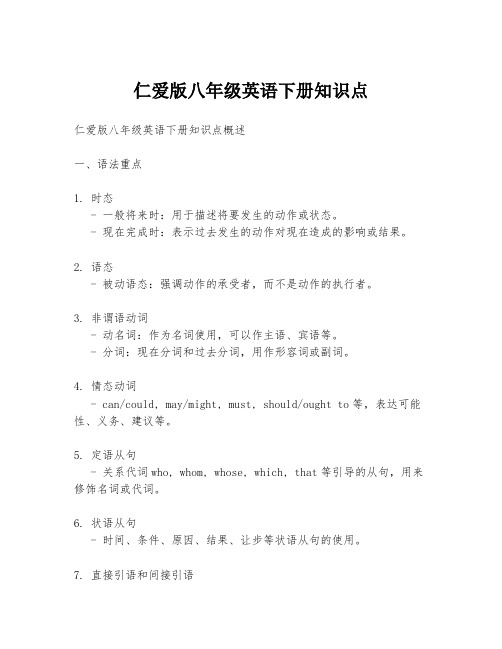
仁爱版八年级英语下册知识点仁爱版八年级英语下册知识点概述一、语法重点1. 时态- 一般将来时:用于描述将要发生的动作或状态。
- 现在完成时:表示过去发生的动作对现在造成的影响或结果。
2. 语态- 被动语态:强调动作的承受者,而不是动作的执行者。
3. 非谓语动词- 动名词:作为名词使用,可以作主语、宾语等。
- 分词:现在分词和过去分词,用作形容词或副词。
4. 情态动词- can/could, may/might, must, should/ought to等,表达可能性、义务、建议等。
5. 定语从句- 关系代词who, whom, whose, which, that等引导的从句,用来修饰名词或代词。
6. 状语从句- 时间、条件、原因、结果、让步等状语从句的使用。
7. 直接引语和间接引语- 引述别人的话,注意时态、人称和指示代词的变化。
二、词汇与短语1. 常用词汇- 描述人物特征的形容词,如kind, honest, creative等。
- 描述日常活动的动词短语,如clean up, take out, give up等。
- 与学校生活相关的名词,如classroom, library, project等。
2. 短语动词- look after, turn off, get along with等。
3. 常见搭配- 形容词与名词的搭配,如good habits, heavy rain等。
- 动词与副词的搭配,如finish quickly, study hard等。
三、阅读理解1. 抓住文章主旨- 通过阅读标题、首段和结尾段,快速把握文章大意。
2. 推理判断- 根据上下文线索,推断生词或隐含信息的含义。
3. 细节理解- 通过关键词定位,准确获取文章中的具体信息。
四、写作技巧1. 句型多样性- 使用复合句、并列句等多样化的句型,丰富文章结构。
2. 逻辑连贯- 使用连接词,如however, therefore, moreover等,使文章结构清晰、逻辑性强。
仁爱版英语八年级下全册语法精讲

仁爱英语八年级下全册语法精讲连系动词的种类及其基本用法一、连系动词的种类。
连系动词也叫系动词,是表示主语“是什么”或“怎么样”的词。
它本身有词义,但不能单独作谓语,后面必须跟表语,构成系表结构来说明主语的状况、性质、特征等。
主要有:be, become, get,turn,grow, look, feel, seem, sound, taste, smell, appear等。
常见的连系动词可分为五种。
1. 状态系动词:只有be一词。
I am used to going about alone.我习惯于独来独往。
2. 持续系动词:表示主语继续或保持一种状况或态度,主要有keep,remain,stay, rest, lie, stand。
I hope you’ll stay healthy.我希望你身体好。
He always kept silent at meeting.他开会时总保持沉默。
The door remained closed. 门仍然关着。
3.表像系动词:表示“看起来好像”,主要有seem, appear, look等。
He looks tired. 他看起来很累。
He seems (to be) quite happy.他好像很快活。
He appeared quite well.他显得身体相当好。
4. 感官系动词:表示“……起来”,有feel (摸起来,感觉) , smell (闻起来) ,sound (听起来) , taste (尝起来,吃起来) 等。
This kind of cloth feels very soft. 这种布摸起来很软。
They looked very tired. 他们看起来很累。
It sounds a good idea.这听起来是个好主意。
This food tastes good.这食物尝起来不错。
5.变化系动词:表示主语变成什么样,即表示从一种状态变为另一种状态。
仁爱版八年级下册英语知识点

仁爱版八年级下册英语知识点仁爱版八年级下册英语知识点概述一、时态与语态1. 一般将来时:用于描述将要发生的动作或状态。
- 构成:will + 动词原形- 例句:We will go on a school trip next week.2. 现在进行时的被动语态:表示正在进行的动作被他人执行。
- 构成:am/is/are + being + 过去分词- 例句:A new road is being built near our school.3. 过去完成时:表示在过去某一时间点之前已经完成的动作。
- 构成:had + 过去分词- 例句:They had finished their homework before the movie started.二、非谓语动词1. 动名词:作为名词使用,表示动作。
- 例句:Swimming is my favorite sport.2. 分词(现在分词与过去分词):- 现在分词:表示正在进行的动作。
- 例句:The children are playing in the park.- 过去分词:表示被动或完成的动作。
- 例句:The window broken by the ball needs to be repaired.三、情态动词1. can/could:表示能力或许可。
- 例句:Can you help me with my homework?- 礼貌请求:Could you please close the door?2. may/might:表示可能性或许可。
- 例句:You may use my computer if you need to.3. must/should:表示建议或义务。
- 例句:You should wear a helmet when riding a bike.- 强调义务:We must obey the traffic rules.四、句型结构1. 条件句:用于表达在特定条件下的结果。
2013仁爱英语八年级下册Unit8 Topic3知识点归纳及测试题(附答案)

Topic 3 一.词汇:talk about 谈论…last month 上个月Xidan Shopping Center西单购物中心charming models 迷人的模特beautiful clothes 漂亮的衣服amazing show 惊人的表演a common dress 一条普通的裙in the world of… 在…领域high fashion 高级时装a minority costume少数民族服装the model in the center of the catwalk T形台中央的模特the others (三个以上之中的)其余人或物= the other + 复数名词as for… 至于full of … 充满…stand for … 代表…Chinese history 中国历史fashion culture 时装文化from then on 从那时起personal style 个人风格design… as … 按…设计…western-style suits 西服heavy cotton jeans厚厚的棉质牛仔裤at one time = once 曾经become / be known to …为…所熟知become / be known(famous)for…因…而出名become/be know(famous) as 作为…而出名二. 重点句型:1.There’s going to be another one there tomorrow.明天在那将举行另一场时装秀。
There is going to be…是There be结构的将来时,表示某地将举行某项运动,或将有某物。
如:There is going to be a football match in our school next week.=There will be a football match in our school next week.我们学校下周将有一场足球比赛。
仁爱版八年级下英语语法归纳,文档

八年级语法归纳Unit5Topic1SectionA系动词+adj. 构成系表结构。
Invitesb./todosth.邀请某人做某事。
Invitesb.\+地点邀请某人去某地。
Prepare for =getreadyfor 为准备。
Saythankstosb.向某人道谢。
SectionBAticketto\for 的票。
Beabletodosth 有能力做某事。
=can。
但是can一般用于现在时和过去时而beableto可以用于任何时态。
Ringsb.up打给某人。
Beproudof 以骄傲。
Bepleasedwith 对满意。
SectionCCareabout关心Care+从句省略aboutGetmarriedtosb.=marrysb. 与某人结婚。
关于花费:Sth.Costsb.+钱Sb.spend+时钱in、onsth.\doingsth.时todosth.钱forsth.Beon上映。
Cheerup使振作。
What for=why。
〔口语〕SectionDComeintobeing 形成。
Befullof=befilledwith 充满。
Endwith 以结尾。
Makepeacewithsb.与某人讲和。
Unit5Topic2To+动词不定式。
SectionASeem/todosth.似乎做某事。
\adj作表语。
Itseemthat+从句。
Havetalkwithsb.与某人交谈。
Bestrictwithsb. 对某人严格。
SectionBFailtodosth.失败,做不到某事。
Atone’sage.在年龄时Attheageof.在岁时Makesb.todosth让某人做某事。
同级比较As+adj\adv原级+as与一样。
Notas\so+adj\adv原级+as与不一样。
Be\getusedtodoingsth.习惯做某事。
Usedtodosth.过去习惯做某事。
SectionCBeafraidofdoingsth. 害怕做某事。
(完整版)仁爱版英语八年级下册知识点梳理

(完整版)仁爱版英语八年级下册知识点梳理Unit 5 Topic 1You look excited【重点词组】1. invite sb. to do sth.邀请某人做某事2.one of +形容词最高级+ 名词复数3. say thanks/hello/sorry/good-bye to sb. 向某人致谢/问好/道歉/告别4. feel/taste/smell/look/sound/seem +adj.5. seem to do sth.seem+adj.it seems that+从句6. a ticket for/to sth.一张……的票7. lonely adj.孤独的alone adj./adv.独自的,一个人的8. because of+n./pron/v-ing 因为,由于9. cheer sb. up使某人振作起来10. care for =take care of = look after照顾11. come into being 形成,产生12. be full of = be filled with充满……13. agree with sb.同意某人14. make peace with sb.与某人和平相处15. in the end =at last = finally最后,最终16. be popular with sb.受某人欢迎【词形变化】1.invite v.邀请invitation n.邀请2.disappionted adj.失望的,沮丧的disappointment n.失望,沮丧disappoint v.使失望3.excite v.使激动,使兴奋excited adj.兴奋的,激动的(修饰人)exciting adj.令人兴奋的,使人激动的(修饰物)4.main adj.主要的mainly adv.主要地5.face n.脸,面部facial adj.面部的6.worry v.担心worried adj.担心的,担忧的【重点句型】1.--How are you doing?你好吗?--Very well.非常好。
仁爱版八年级英语(下册)语言知识点归纳
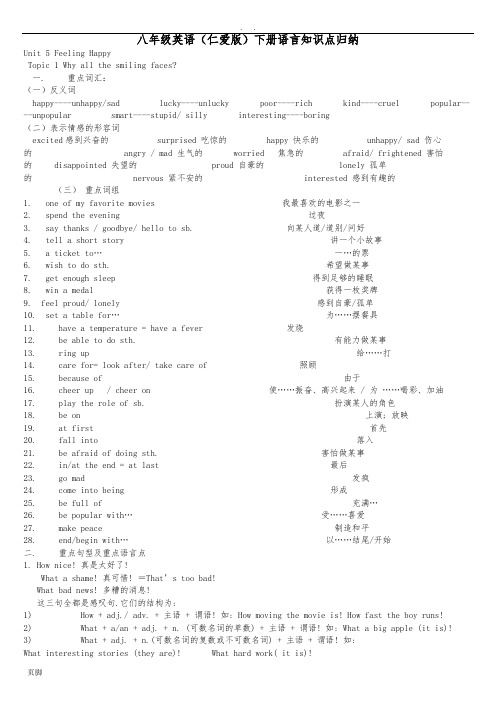
八年级英语(仁爱版)下册语言知识点归纳Unit 5 Feeling HappyTopic 1 Why all the smiling faces?一. 重点词汇:(一)反义词happy----unhappy/sad lucky----unlucky poor----rich kind----cruel popular----unpopular smart----stupid/ silly interesting----boring(二)表示情感的形容词excited感到兴奋的 surprised 吃惊的 happy 快乐的 unhappy/ sad 伤心的 angry / mad 生气的 worried 焦急的 afraid/ frightened 害怕的 disappointed 失望的 proud 自豪的 lonely 孤单的 nervous 紧不安的 interested 感到有趣的(三)重点词组1. one of my favorite movies 我最喜欢的电影之一2. spend the evening 过夜3. say thanks / goodbye/ hello to sb. 向某人道/道别/问好4. tell a short story 讲一个小故事5. a ticket to…一…的票6. wish to do sth. 希望做某事7. get enough sleep 得到足够的睡眠8. win a medal 获得一枚奖牌9. feel proud/ lonely 感到自豪/孤单10. set a table for…为……摆餐具11. have a temperature = have a fever 发烧12. be able to do sth. 有能力做某事13. ring up 给……打14. care for= look after/ take care of 照顾15. because of 由于16. cheer up / cheer on 使……振奋、高兴起来 / 为……喝彩、加油17. play the role of sb. 扮演某人的角色18. be on 上演; 放映19. at first 首先20. fall into 落入21. be afraid of doing sth. 害怕做某事22. in/at the end = at last 最后23. go mad 发疯24. come into being 形成25. be full of 充满…26. be popular with…受……喜爱27. make peace 制造和平28. end/begin with…以……结尾/开始二. 重点句型及重点语言点1. How nice! 真是太好了!What a shame! 真可惜! =That’s too bad!What bad news! 多糟的消息!这三句全都是感叹句.它们的结构为:1) How + adj./ adv. + 主语 + 谓语! 如: How moving the movie is! How fast the boy runs!2) What + a/an + adj. + n. (可数名词的单数) + 主语 + 谓语! 如: What a big apple (it is)!3) What + adj. + n.(可数名词的复数或不可数名词) + 主语 + 谓语! 如:What interesting stories (they are)! What hard work( it is)!2. Because he can’t get a ticket to The Sound of Music. 因为他没有买到《音乐之声》的票.to 表“的”,常见的搭配如下:a ticket to The Sound of Music 一《音乐之声》的票the answer to the question 问题的答案the key to the door 门的钥匙the way to…去…..的路3. I think Mr. Lee likes it very much and really wishes to watch it. 我认为老师非常喜欢它而且的确想去看. wish/ hope to do sth.希望做某事与 wish 相关的结构还有: wish/ hope + that引导的从句; 如:I wish/ hope (that) we will win.我们可以说wish sb. to do sth. 而不能说hope sb. to do sth.;4. I’ll ring up Michael later. 稍后我打给迈克.ring up sb. = call/ ring/ phone sb. = give sb. a ring/ call/ telephone = make a telephone to sb.当宾语为代词时, 只能放中间.如: ring me/him/her up5.…since they were not able to go. ……既然他们不能去.can与be able to 二者都表“能;会”,在指“一般能力”时,常互换。
[原创归纳]仁爱版八年级下英语语法归纳
![[原创归纳]仁爱版八年级下英语语法归纳](https://img.taocdn.com/s3/m/8d95b6f58ad63186bceb19e8b8f67c1cfad6eed0.png)
初二年下册英语语法归纳(仁爱版)【2】Unit5Topic1SectionA2.1nvitesb./todosth.邀请或人做某事;Invitesb.\+地点邀请或人去某地.3.Prepare...for...=getreadyfor...为预备.4.Saythankstosb.向或人道谢. SectionBl.Aticketto\for的票.2.Beabletodosth...=can有才能做某事.但是can一般用于如今时和曩昔时而beableto可以用于任何时态・3................................................................................ Ringsb.up打德律风给或人.4.Beproudof以自满.5.Bepleasedwith.对..满足.SectionC1.Careabout关怀;Care+从句省略about2.Getmarriedtosb.=marrysb.与或人娶亲.3.关于消费:Sth.Costsb.+钱;Sb.spend+时\钱in.onsth.'doingsth.Ittakesb\时todosth.;Sb.pay钱forsth.4.Beon上映.5.Cheerup使振作.6.What...for=why.(白话)SectionDeintobeing形成.2.Befullof=befilledwith充满.3.......................... Endwith以结尾.4.Makepeacewithsb.与或人媾和.Unit5Topic2SectionA1.Seem/todosth.似乎做某事.\adj作表语.;Itseemthat+从句.2.Havetalkwithsb.与或人攀谈.3.Bestrictwithsb.对或人严厉.SectionBl.Failtodosth.掉败,做不到某事.2.Atone'sage.在年纪时3.Attheageof.在岁时4.Makesb.todosth让或人做某事.As+adj\adv原级+as与一样;Notas\so+adj\adv原级+as与不一样.6.Be\getusedtodoingsth.习惯做某事;Usedtodosth.曩昔习惯做某事.SectionC 1.Beafraidofdoingsth.畏惧做某事.2.Dealwith=dowith.处理.4.Refusetodosth.谢绝做某事.5.Eventhough=even讦即使.6.Not...anylonger=nolonger不再.7.Fallasleep入睡.8.Inone'steens在或人的时期.9.Give.ahand=dosb.afavor=helpsb.给或人关心.10.比较级+and+比较级越来越程度递增.The+比较级...The+比较级…越越两种情形同时变.11.原因状语从句.Unit5Topic3SectionA1.Have\has+动词曩昔分词.如今完成时.2.Can'tbe确定不是,否认推想.3.Mustbe必定是,确定推想.4.Maybe可能是,猜测推想.5.Attheendof...在…的最后;Intheendof...最后.6・That\it's+adj+foi\tobdosth.7.1nsteadof+n.\v\代…代替8.Taketurnstodosth.=taketurnsatdoingsth.=dobyturns轮流做某事.SectionB 1......................................... B ebad\good for...对有害\益.2661alongwithsb\sth与相处得好.3.Justas似乎.4.Smileat\tosb.\sth.微笑面临或人.某事;Smile,微笑(没有声音);Laugh,大笑(有声音),Laughatsb.取笑或人.5.Giveasurprisetosb=givesbasurprise给或人一个惊喜.6.0ntheone'swayto...在或人去的路上;后接副词则省去to.SectionC1.世界上举世无双的事物前加定冠词the2.Hadbetterdosth\notdosth.最好做某事.不要做某事.SectionD1.Getbacktosth持续回到某事上.Unit6topic1l.Goonavisitto...去旅游.参不雅.2.1t'shatetosay这很难说.3.Decidetodosth决议做某事.4.Make(take)adecide下决议.5.Decideon\upon决议.SectionBl.Ticketat+钱+for...票的价钱.2・具体某一天的早・中・晚上,前用介词on・SectionCeupwith…想出.2.Lookforwardtosth\doingsth.愿望某事.愿望做某事.3.Hearfromsb收到或人来信.SectionD动词不定式1•根本情势:to+动词本相(确定情势)Notto+动词本相(否认情势)2・特点:没有人称和数的变化・3・常用句型:It's+adj+todosth.Too+adj+todosth・4・动词不定式可以跟疑问词连用・E.g:Idon'tknowwhattodo\howtodoit.Unit6topic2SectionA1.Plantodosth.筹划做某事.2.Makeaplanto...\makeplansto...制订的筹戈U.SectionB1.Atthefoot of...在的脚下.2.Marksthebeginningof标志着的开端.3.Bytheway.趁便问一下.4.Onbothsides of...在的两旁.5.“几个半”表示办法:基数词+and+ahalf+n.=基数词+n.+and+ahalf.E.g.oneandahalfyears=oneyearandahalf.一年半.6.表示方位的介词差别Inthe+方位名词+of・・・指某一规模内的地区.(中国,北京)tothe+方位名词+of・・・指互不交界互不管辖的地区.(中国,日本)onthe+方位名词+of・互相交界但互不管辖的地区.(中国,尼泊尔)SectionCl.Outofsight看不见(视线之外)2.Noticesbdo\doingsth.留意或人(正在做)做某事.3.Can'thelpdoing不由得.4.Arrivein+大地点;Arriveon+小地点SectionD1.Havefundoingsth.从做某事中得到乐趣.2.时光状语从句特点:常用一般如今时表示未来时;主句未来时,从句用一般如今时;时态一致——主句与从句同时为曩昔时.引诱时光状语从属连词:When(当的时刻,强调统一时光或一前一后)while(当的时刻,带有延续性)before(在之前)after(在之后)as(当的时刻)until.till(直至U为止)assoonas (一就)Unit6topic3SectionAl.Beafraidofdoingsth.\that+从句.畏惧做某事.SectionB1.Warnsbtodosth\nottodosth.警告.提示或人做某事.不做某事.2.Warnsbaboutsth提示或人某事.SectionC1.Goondoingsth持续做某事(统一件);Goontodosth.持续做某事(另一件)2.Make\letsbdosth使或人做某事.3.使役动词makelethave等,一律省去to,直接加动词本相.SectionD前提状语从句:1•由if,uness(除非)引诱的状语从句叫前提状语从句.2.特点:常用一般如今时表示未来时;主句未来时,从句用一般如今时.主句含一般未来时.祈使句•情态动词,从句用一般如今时.Unit7topic1SectionA1.Turnto=asksb.forhelp向或人乞助.2.Knowabout懂得.3.Chatwithsb.ontheinternet和或人在网上谈天.4.Tryone'sbest\doone'sbest尽或人最大尽力.5./Thinkover细心斟酌\Thinkof斟酌,对有意见.此时可与thinkabout交换.6.Imaginedoingsth.想象做某事.SectionB1.Haveasweettooth爱吃甜食.2.What'smore并且.SectionCl.Inorderto do...为了做;Inorderthat+从句引诱目标状语从句.2.Keepupsth.保持做……3.Seed+间接宾语(sb.)+直接宾语(sth.)双宾构造句.4.Givesb.bes twishesto.或人最好的祝贺给...What引诱的感慨句,强调名词,单数可数名词前带冠词a\an・有时主语和谓语可以省去.SectionDetrue系表构造.成为实际.2.Invitation邀请函.3•宾语从句IUnit7topic2SectionA1.Beglad+adj.+that从句.愉快……2.Cutsth.切某物;Cutup切碎;Cutsth.Into...切成;Cutdown砍到.3.Addto添加;Add...to…将加在…;Addup加起来;Addupto总计为4.表次序词:(含序数词)First起首.Second其次next在此then然后.Afterthat然后finally最后. SectionBl.Spreadsthonsth.往上面抹2.Practicemakesperfect熟能生巧. SectionCl.Startwith以……开端.2.Eatsth.up吃完,吃光.3.Finishdoingsth.完成做某事.4.Pickup捡起,捡起.SectionD1.Atthesametime同时.2•宾语从句IIf\whether引诱的宾语从句,不能省略引诱词可以与whether通用,但在whether ・・・or not的情形下则不能.Unit7topic3SectionAl.Forsale待售;0nsale出售.2.Besatisfiedwith...对满足.3.Wishsb.sth.祝贺或人;Wishtodosth=Hopetodosth.愿望做某事.Wishsb.todosth.愿望或人做某事.4.Hope斟酌可能性的“愿望”;Wish不斟酌是否可能.SectionBl.Ordersbtodosth敕令或人做或人;Orderthat+从句.SectionCl.Beworthdoingsth.值得做某事.SectionD1.1t'ssaid...据说后接that引诱从句.2.1nshort总之.3.Notonly.butalso.不但..并且..衔接的并列成分必须雷同,当衔接两个名词或代词为主语.谓语动词单复数采用就近原则,保持一致.4.Notall并非,部分否认.5.It'sbelievedthat...信任6•副词比较级根本用法:副词的比较等级情势与变化与形容词大致雷同,今后缀-ly结尾的比较级和最高等大多在前面加more和most(1)原级・As+adj./adv.原级+as和一样.⑵比较级.Adj./adv.比较级+than比…更…⑶最高等•三者或三者以上比较时,常用the+adj./adv.最高等+in/of・・・(比较规模).副词最高等前可以省略the否认比较级可用less+adj./adv.原级+than.同级比较中第一个as前面用序数词或量词润饰,可表示倍数关系.形容词和副词比较级前用much\alot等润饰,表示不同程度.借助other.else或否认词,比较级情势可用来表示最高等概念.(4)the+比较级,the+比较级表示越越⑸比较级+and+比较级.表示越来越……Unit8Topic1SectionA1.目标状语从句.(同成果状语从句)So・・・that・・・引诱的状语从句.So+adj./adv.+that・...so+adj.+an/a+名词单数+that・・・如斯以至于用于引诱主句导致的成果.Such+n.+that•从句•同样表示如斯以至于.不同:so后面接形容词或副词,such后面接名词.SectionBl.Bemakeof+原料由制成.(看得出原材料)2.Bemakefrom+原料由制成.(看不出原材料)3.Afford(tobuy)sth.买得起.累赘得起SectionCl.Dependon依附.取决于.2.Dependonsb.todosth.dependonsb./sth.3.Thesame as...与一样.4.Nearly差不多.Near邻近.5.Hard尽力地.Hardly几乎不.SectionD1.Protect....from...破坏…不受…的损害.2.Youarewhatyouwear衣如其人. Unit8Topic2SectionA1.Allowsb.todosth.许可或人做某事;Allowdoingsth许可做某事.2.Suitableforsb.todosth.对或人来说合适做某事.3.Stopsb.fromdoingsth.阻拦或人做某事.4.Tocarryouttheplan把筹划付诸行动.5.Atwork在工作,从事于SectionBSectionC...SectionD1.Advise建议.作动词;Advice建议.作名词.2.Artofdressing着装艺术. Unit8Topic3SectionA1.Thereisgoingtobe=therewillbe(初一常识)未来时构造.SectionB1.Askforsb./sth至于,就或人.某事而言.2.Another作形容词,意为又一个,再一个.其构造为:/another+n.单数可数=onemore+n.单数可数.\another+数词+n.复数可数=数词+more+n.复数可数.SectionCl.Getitsname得名.2.Design…as…把设计成3.Either...or...要么要么,不是就是,表选择关系.4.区分that,those,one,ones.That指代上文消失过的不可数名词.Those指代上文消失过的复数名词.One指代上文消失过的可数名词的单数.Ones指代上文消失过的可数名词的复数.SectionDl.Well-known=widelyknown众所周知.2.Atthetime一度,曾经.3.Atatime每一次.用在句末.4.Attimes有时刻.等于sometimes5.Except除了以外.除去部分不包括在内;Besides除了以外,还有除去部分包括在内;But除了......以外,没有......,只有......6•宾语从句皿删除:假如句中含有助动词do\does\did就把其删掉落后面的动词,作出响应的变化.移动:假如句子含有情态动词和be动词,以及否认的助动词,把它们移动到主语后,行动动词前.宾语从句的口诀:进修宾从要留意,时态语序和连词.时态主从要呼应:主句若为如今时,从句时态随句意.主句若为曩昔时,从句时态变曩昔.宾从所示表真谛,时态不变不疑惑.语序要用陈述序,切莫照搬疑问句.That衔接陈述句,省与不省要留意•从句若表“是否”时fwhether要切记.特别问句做宾语,仍用本来疑问词.三个问题要记牢,切莫丢东又往西.。
初二下册英语语法知识点总结归纳仁爱版
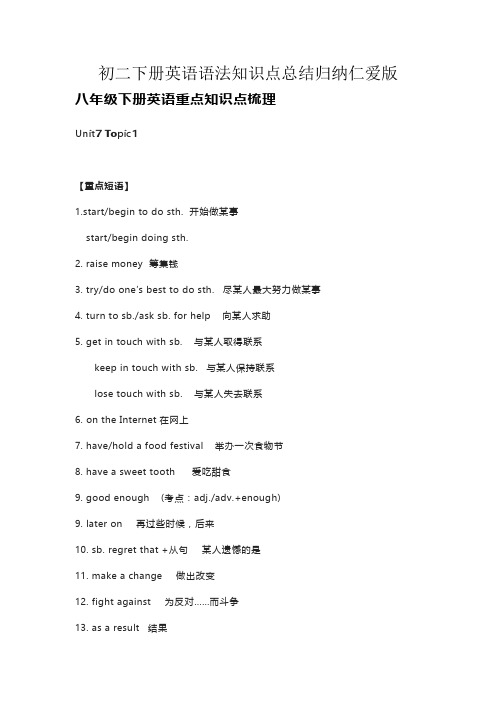
初二下册英语语法知识点总结归纳仁爱版八年级下册英语重点知识点梳理Unit7 Topic1【重点短语】1.start/begin to do sth. 开始做某事start/begin doing sth.2. raise money 筹集钱3. try/do one’s best to do sth. 尽某人最大努力做某事4. turn to sb./ask sb. for help 向某人求助5. get in touch with sb. 与某人取得联系keep in touch with sb. 与某人保持联系lose touch with sb. 与某人失去联系6. on the Internet在网上7. have/hold a food festival 举办一次食物节8. have a sweet tooth 爱吃甜食9. good enough (考点:adj./adv.+enough)9. later on 再过些时候,后来10. sb. regret that +从句某人遗憾的是11. make a change 做出改变12. fight against 为反对……而斗争13. as a result 结果14. child workers 童工15. thank you for doing sth.因为做某事而感谢某人16. make one’s dream come truerealize / achieve one's dream使某人的梦想实现【词形转换】1. success n.成功, 胜利succeed v.successful adj.2. west n.西方,西部western adj.西方的,西部的3. Greece n.希腊Greek adj.希腊的 n.希腊人4. India n.印度Indian adj.印度的,印第安人的n.印度人,印第安人5. fry v.油炸,油煎fried adj. 油炸的6. Italy n.意大利Italian adj.意大利(人)的,意大利语的n.意大利人,意大利语7. Africa n.非洲African adj.非洲的,非洲人的n.非洲人8. Russia n.俄国Russian adj.俄国(人)的,俄语的n.俄国人,俄语【重点句型】1. When and where shall we have the food festival?我们什么时候在哪儿举办食物节?2. Let’s try our best to make it a success.让我们尽我们做大的努力使它成为一件成功的事情。
八年级下册英语语法知识点(仁爱版)
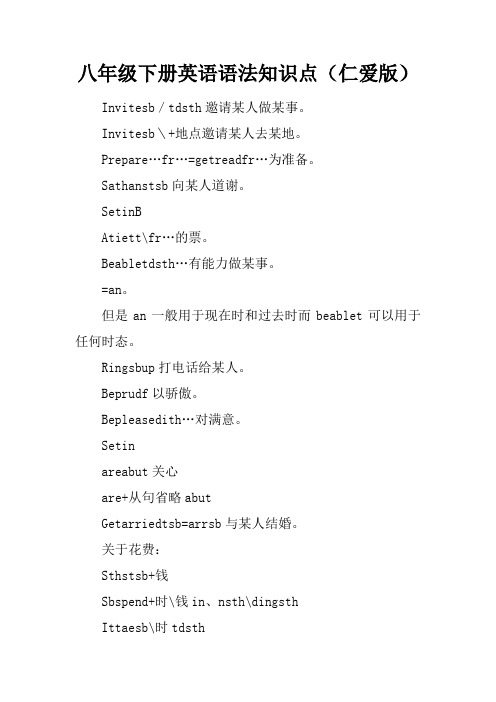
八年级下册英语语法知识点(仁爱版)Invitesb/tdsth邀请某人做某事。
Invitesb\+地点邀请某人去某地。
Prepare…fr…=getreadfr…为准备。
Sathanstsb向某人道谢。
SetinBAtiett\fr…的票。
Beabletdsth…有能力做某事。
=an。
但是an一般用于现在时和过去时而beablet可以用于任何时态。
Ringsbup打电话给某人。
Beprudf以骄傲。
Bepleasedith…对满意。
Setinareabut关心are+从句省略abutGetarriedtsb=arrsb与某人结婚。
关于花费:Sthstsb+钱Sbspend+时\钱in、nsth\dingsthIttaesb\时tdsthSbpa钱frsthBen上映。
heerup使振作。
hat…fr=h。
(口语)SetinDeintbeing形成。
Befullf=befilledith充满。
Endith以结尾。
aepeaeithsb与某人讲和。
UnitTpi2SetinASee/tdsth似乎做某事。
\ad作表语。
Itseethat+从句。
Havetalithsb与某人交谈。
Bestritithsb对某人严格。
SetinBFailtdsth失败,做不到某事。
Atne’sage在年龄时Attheagef在岁时aesbtdsth让某人做某事。
As+ad\adv原级+as与一样。
Ntas\s+ad\adv原级+as与不一样。
Be\getusedtdingsth习惯做某事。
Usedtdsth过去习惯做某事。
SetinBeafraidfdingsth害怕做某事。
Refusetdsth拒绝做某事。
Eventhugh=evenif即使。
Nt…anlnger=nlnger不再。
Fallasleep入睡。
Inne’steens在某人的时代。
Give…ahand=dsbafavr=helpsb给某人帮助。
比较级+and+比较级越来越程度递增。
[原创归纳]仁爱版八年级下英语语法归纳
![[原创归纳]仁爱版八年级下英语语法归纳](https://img.taocdn.com/s3/m/e276c514cd1755270722192e453610661ed95acb.png)
初二年下册英语语法归纳(仁爱版)【2】Unit 5 Topic 1Section A2.Invite sb. /to do sth. 邀请或人做某事;Invite sb. \+地点邀请或人去某地.3.Prepare…for…=get ready for… 为……预备.4.Say thanks to sb. 向或人道谢. Section B1.A ticket to\for… ……的票.2.Be able to do sth…=can 有才能做某事.但是can 一般用于如今时和曩昔时而be able to可以用于任何时态.3.Ring sb. up 打德律风给或人.4.Be proud of 以……自满.5.Be pleased with… 对……满足.Section C1.Care about 关怀;Care+从句省略about2.Get married to sb.= marry sb. 与或人娶亲.3.关于消费:Sth. Cost sb.+钱;Sb. spend+时\钱 in.on sth.\doing sth.It take sb\时 to do sth.;Sb.pay 钱 for sth.4.Be on 上映.5.Cheer up 使……振作.6.What…for=why.(白话)Section De into being 形成.2.Be full of=be filled with充满.3.End with 以……结尾.4.Make peace with sb. 与或人媾和.Unit 5 Topic 2Section A1.Seem /to do sth. 似乎做某事.\adj作表语.; It seem that+从句.2.Have talk with sb.与或人攀谈.3.Be strict with sb. 对或人严厉.Section B1.Fail to do sth. 掉败,做不到某事.2.At one’s age.在……年纪时3.At the age of.在……岁时4.Make sb. to do sth 让或人做某事.As+adj\adv原级+as 与……一样;Not as\so+adj\adv原级+as 与……不一样.6.Be\get used to doing sth.习惯做某事;Used to do sth. 曩昔习惯做某事. Section C1.Be afraid of doing sth. 畏惧做某事.2.Deal with=do with. 处理.4.Refuse to do sth. 谢绝做某事.5.Even though=even if 即使.6.Not… any longer=no longer 不再.7.Fall asleep 入睡.8.In one’s teens 在或人的时期.9.Give…a hand=do sb. a favor=help sb. 给或人关心.10.比较级+and+比较级越来越……程度递增.The+比较级…The+比较级… 越……越……两种情形同时变.Unit 5 Topic 3Section A1.Have\has +动词曩昔分词.如今完成时.2.Can’t be 确定不是,否认推想.3.Must be 必定是,确定推想.4.May be 可能是,猜测推想.5.At the end of… 在…的最后;In the end of…最后.6.That\it’s+adj+for sb\to do sth.7.Instead of+n.\v\代… 代替……8.Take turns to do sth.=take turns at doing sth.=do by turns 轮流做某事.Section B1.Be bad\good for… 对……有害\益.2.Get along with sb\sth 与……相处得好.3.Just as 似乎.4.Smile at\to sb.\sth. 微笑面临或人.某事;Smile,微笑(没有声音);Laugh,大笑(有声音),Laugh at sb. 取笑或人.5.Give a surprise to sb=give sb a surprise 给或人一个惊喜.6.On the one’s way to… 在或人去……的路上;后接副词则省去to.Section C1.世界上举世无双的事物前加定冠词the2.Had better do sth\not do sth. 最好做某事.不要做某事.Section D1.Get back to sth 持续回到某事上.Unit 6 topic1Section A1.Go on a visit to… 去……旅游.参不雅.2.It’s hate to say 这很难说.3.Decide to do sth 决议做某事.4.Make(take) a decide 下决议.5.Decide on\up on 决议.Section B1.Ticket at +钱+for…票的价钱.2.具体某一天的早.中.晚上,前用介词on.Section Ce up with…想出.2.Look forward to sth\doing sth.愿望某事.愿望做某事.3.Hear from sb收到或人来信.Section D动词不定式1.根本情势:to+动词本相(确定情势)Not to+动词本相(否认情势)2.特点:没有人称和数的变化.3.常用句型:It’s + adj+to do sth.Too+adj+to do sth.4.动词不定式可以跟疑问词连用.E.g:I don’t know what to do\ how to do it.Unit 6 topic 2Section A1.Plan to do sth. 筹划做某事.2.Make a plan to…\make plans to… 制订……的筹划.Section B1.At the foot of… 在……的脚下.2.Marks the beginning of 标志着……的开端.3.By the way. 趁便问一下.4.On both sides of… 在……的两旁.5.“几个半”表示办法:基数词+and+ a half +n.=基数词 +n.+ and +a half.E.g. one and a half years=one year and a half. 一年半.6.表示方位的介词差别In the + 方位名词+ of… 指某一规模内的地区.(中国,北京)to the + 方位名词 + of… 指互不交界互不管辖的地区.(中国,日本)on the + 方位名词+of… 互相交界但互不管辖的地区.(中国,尼泊尔)Section C1.Out of sight 看不见(视线之外)2.Notice sb do\doing sth. 留意或人(正在做)做某事.3.Can’t help doing 不由得.4.Arrive in + 大地点;Arrive on+ 小地点Section D1.Have fun doing sth. 从做某事中得到乐趣.2.时光状语从句特点:常用一般如今时表示未来时;主句未来时,从句用一般如今时;时态一致——主句与从句同时为曩昔时.引诱时光状语从属连词:When(当……的时刻,强调统一时光或一前一后)while(当……的时刻,带有延续性)before(在……之前)after(在……之后)as(当……的时刻)until.till(直到……为止)as soon as(一……就……)Unit 6 topic 3Section A1.Be afraid of doing sth.\ that+从句.畏惧做某事.Section B1.Warn sb to do sth\ not to do sth. 警告.提示或人做某事.不做某事.2.Warn sb about sth 提示或人某事.Section C1.Go on doing sth 持续做某事(统一件);Go on to do sth. 持续做某事(另一件)2.Make\let sb do sth 使或人做某事.3.使役动词 make let have 等,一律省去to ,直接加动词本相.Section D前提状语从句:1.由if, unless(除非)引诱的状语从句叫前提状语从句.2.特点:常用一般如今时表示未来时;主句未来时,从句用一般如今时.主句含一般未来时.祈使句.情态动词,从句用一般如今时.Unit 7 topic 1Section A1.Turn to = ask sb. for help 向或人乞助.2.Know about 懂得.3.Chat with sb. on the internet 和或人在网上谈天.4.Try one’s best \ do one’s best 尽或人最大尽力.5./Think over 细心斟酌\Think of 斟酌,对……有意见.此时可与think about 交换. 6.Imagine doing sth. 想象做某事.Section B1.Have a sweet tooth 爱吃甜食.2.What’s more 并且.Section C1.In order to do… 为了做;In order that+ 从句引诱目标状语从句.2.Keep up sth. 保持做……3.Seed +间接宾语 (sb.) +直接宾语(sth.)双宾构造句.4.Give sb. bes t wishes to… 或人最好的祝贺给…….Section De true 系表构造.成为实际.2.Invitation 邀请函.Unit 7 topic 2Section A1.Be glad + adj. +that 从句. 愉快……2.Cut sth. 切某物;Cut up 切碎;Cut sth. Into… 切成;Cut down 砍到.3.Add to添加…上;Add…to…将……加在…;Add up 加起来;Add up to 总计为……4.表次序词:(含序数词)First 起首.Second 其次next在此then然后.After that 然后 finally 最后. Section B1.Spread sth on sth. 往……上面抹……2.Practice makes perfect 熟能生巧. Section C1.Start with 以……开端.2.Eat sth. up 吃完,吃光.3.Finish doing sth. 完成做某事.4.Pick up 捡起,捡起.Section D1.At the same time 同时.Unit 7 topic3Section A1.For sale 待售;On sale 出售.2.Be satisfied with… 对……满足.3.Wish sb. sth. 祝贺或人……;Wish to do sth = Hope to do sth. 愿望做某事.Wish sb. to do sth. 愿望或人做某事.4.Hope 斟酌可能性的“愿望”;Wish 不斟酌是否可能.Section B1.Order sb to do sth 敕令或人做或人;Order that + 从句.Section C1.Be worth doing sth. 值得做某事.Section D1.It’s said… 据说…… 后接that引诱从句.2.In short 总之.3.Not only…but also… 不但……并且……衔接的并列成分必须雷同,当衔接两个名词或代词为主语.谓语动词单复数采用就近原则,保持一致.4.Not all 并非,部分否认.5.It’s believed that… 信任……副词的比较等级情势与变化与形容词大致雷同,今后缀-ly 结尾的比较级和最高等大多在前面加 more 和 most(1)原级.As + adj. / adv. 原级+ as 和……一样.(2)比较级. Adj. / adv. 比较级 + than 比…更…(3)最高等.三者或三者以上比较时,常用the + adj. / adv. 最高等+ in/of…(比较规模). 副词最高等前可以省略 the否认比较级可用 less + adj. / adv. 原级+ than.同级比较中第一个as前面用序数词或量词润饰,可表示倍数关系.形容词和副词比较级前用much\ a lot 等润饰,表示不同程度.借助other.else 或否认词,比较级情势可用来表示最高等概念.(4)the + 比较级……,the + 比较级……. 表示越……越……(5)比较级 + and + 比较级. 表示越来越……Unit 8 Topic 1Section A1.目标状语从句.(同成果状语从句)So…that… 引诱的状语从句.So + adj. / adv. +that….so + adj. + an/a +名词单数+ that… 如斯……以至于……用于引诱主句导致的成果.Section B1.Be make of + 原料由……制成.(看得出原材料)2.Be make from +原料由……制成.(看不出原材料)3.Afford ( to buy ) sth. 买得起.累赘得起……Section C1.Depend on 依附.取决于.2.Depend on sb. to do sth. depend on sb. / sth.3.The same as… 与……一样.4.Nearly 差不多.Near 邻近.5.Hard 尽力地. Hardly 几乎不.Section D1.Protect….from… 破坏…不受…的损害.2.You are what you wear 衣如其人. Unit 8 Topic 2Section A1.Allow sb. to do sth. 许可或人做某事;Allow doing sth 许可做某事.2.Suitable for sb. to do sth. 对或人来说合适做某事.3.Stop sb. from doing sth. 阻拦或人做某事.4.To carry out the plan 把筹划付诸行动.5.At work 在工作,从事于……Section BSection C...Section D1.Advise建议.作动词;Advice 建议.作名词.2.Art of dressing 着装艺术.Unit 8 Topic 3Section A1.There is going to be = there will be (初一常识)未来时构造.Section B1.Ask for sb. / sth 至于,就或人.某事而言.2.Another 作形容词,意为又一个,再一个.其构造为:/another + n.单数可数 = one more + n.单数可数.\another + 数词 + n.复数可数 = 数词 + more + n.复数可数.Section C1.Get its name 得名.2.Design … as … 把……设计成……3.Either… or… 要么……要么,不是……就是……,表选择关系.4.区分that, those, one, ones.That 指代上文消失过的不可数名词.Those 指代上文消失过的复数名词.One 指代上文消失过的可数名词的单数.Ones 指代上文消失过的可数名词的复数.Section D1.Well-known = widely known 众所周知.2.At the time 一度,曾经.3.At a time 每一次.用在句末.4.At times 有时刻.等于sometimes5.Except 除了……以外.除去部分不包括在内;Besides 除了……以外,还有…… 除去部分包括在内;But 除了……以外,没有……,只有……宾语从句的口诀:进修宾从要留意,时态语序和连词.时态主从要呼应:主句若为如今时,从句时态随句意.主句若为曩昔时,从句时态变曩昔.宾从所示表真谛,时态不变不疑惑.语序要用陈述序,切莫照搬疑问句. That衔接陈述句,省与不省要留意.从句若表“是否”时,if/whether 要切记. 特别问句做宾语,仍用本来疑问词.三个问题要记牢,切莫丢东又往西.。
仁爱版英语八年级下全册语法精讲

仁爱英语八年级下全册语法精讲连系动词的种类及其基本用法一、连系动词的种类。
连系动词也叫系动词,是表示主语“是什么”或“怎么样”的词。
它本身有词义,但不能单独作谓语,后面必须跟表语,构成系表结构来说明主语的状况、性质、特征等。
主要有:be, become, get,turn,grow, look, feel, seem, sound, taste, smell, appear等。
常见的连系动词可分为五种。
1. 状态系动词:只有be一词。
I am used to going about alone.我习惯于独来独往。
2. 持续系动词:表示主语继续或保持一种状况或态度,主要有keep, remain,stay, rest, lie, stand。
I hope you’ll stay healthy.我希望你身体好。
He always kept silent at meeting.他开会时总保持沉默。
The door remained closed. 门仍然关着。
3.表像系动词:表示“看起来好像”,主要有seem, appear, look等。
He looks tired. 他看起来很累。
He seems (to be) quite happy.他好像很快活。
He appeared quite well.他显得身体相当好。
4. 感官系动词:表示“……起来”,有feel (摸起来,感觉) , smell (闻起来) ,sound (听起来) , taste (尝起来,吃起来) 等。
This kind of cloth feels very soft. 这种布摸起来很软。
They looked very tired. 他们看起来很累。
It sounds a good idea.这听起来是个好主意。
This food tastes good.这食物尝起来不错。
5.变化系动词:表示主语变成什么样,即表示从一种状态变为另一种状态。
仁爱英语八年级下知识点和语法点归纳.doc

Unit 6 Topic 11、动词不定式 一、 重点词汇 Help sb (to )do sth 帮助某人做某事1、field 田地, 2 、trip 旅游, 3 、 vehicle 车辆, (1)t ell / ask / order / want / teach sb to do sth;4、airline 航班, 5 、 raise 筹集, 6 、 discuss 讨论,例如: Mother told me not to play in the street. 妈妈告诉 7、book 预定, 8 、 railway 铁路, 9 、 cinema 电影院,我,不要在马路上玩。
10、condition 条件 , 11 、comfortable 舒适的, 12 、standard 标准的,(2)see / hear / watch / notice / feel / make / let / have 13、 draw 抽奖,画, 14 、 land 着陆,土地二、重点短语: sb do sth;1 go on 继续 go on a spring field trip 继续去春游 例如: I often heard him sing in the next room. 我常听见他 go on a visit / trip to =have a visit /trip to在隔壁唱歌。
2 decide on致力于 decide to do sth 决定做某事 Unit 6 Topic 2make a decision 决定3 My pleasure. = It ’s a / my pleasure.我很乐意一、重点词汇4 Have a good trip. 玩得愉快 Havea good / wonderful time.1、 receive收到, 2 、 perfect 完美地, 3 、 camp 野营,4、 face 面对,脸; 5 、 north 北方, 6 、 space 空间, 5 see the sunrise 看日出7、 push 推, 8、 direction 方向, 9 、 step 步,阶段; 6 raise money 筹集钱 make / earn money 赚钱10、 rush 冲, 11 、 notice 注意, 12 、 huge 巨大的, 13 、 guard 警戒 save money 节省钱 二、重点短语7 book / order sth for sb 为某人预定、、、 1 speak to对某人说话 8 pay for 付、、、的钱2 be busy doing sth忙着做某事 9 make a reservation make a hotel reservation3 ride one ’s bicycle to = cycle to 骑自行车去、、、10 plan to do sth 计划做某事4 would like sb to do sth = want sb to do sth想要做某事 11 work out 解决 work it / them out5 come along with sb跟着某人 12 the cost of the price of 、、、 、、、的花费、、、的6 at the foot of 、、、底部 at the top of 、、、顶部 价格7 spread over 延伸13 come up with 8 the beginning / start of 、、、的开始14 look forward to doing sth 盼望做某事9 on both sides of = on each side of = on either side of 两 15 hear from = get / receive a letter from 收到、、、来信边16 in the day / daytime 在白天 10 make sure =be sure 确定at night 在晚上 in the evening 在晚上 11 at the back 在背后17 the sea of clouds 云海12 two and a half hours = two hours and a half 两个半小时 18 place of interest 有趣的地方13 tell good from bad三、重点语法14 in the of 在、、、里 on the of 在、、边上 to the of相隔11 in danger15 be surprised at sth 对某事吃惊be surprised to do sth 12 around the world = all over the world = through out theto one ’s surprise world16 in different directions 在不同的方向 in all directions 在 13 times as as所有方向14 millions of hundreds of millions of17 step on one ’s toes 15 be born18 rush out of 冲出16 make a comeback19 out of sight 看不到out of one ’s sight 17 lead to20 each other = one another每一个21 ride to骑自行车去22 be famous for因、、而出名be famous as作为、、出名23 can ’t / couldn’t help doing禁不住做某事24 here and there = every where到处25 thank goodness谢天谢地26 have fun doing sth做某事很有趣;Unit 6 Topic 31 be popular with2 get / be used to doing sth3 be afraid of doing sth = be afraid to do sth4 obey / follow the traffic rules break thetraffic rules5 avoid air pollution avoid doing sth6 It ’s easy to park bikes.7 adj比较级+_than any other +n = the +adj最高级+of all the +n 复8 slow down9 run into = knock into run to10 warn sb to do sth warn sb not to do sth =warn sb against doing sth 18 win the race beat sb19 It seems impossible to beat him.20 It ’s certain that21 break the record hold the record set arecord22 instead of23 decide not to do sth24 go through25 The roads are very difficult to ride on.26 the World Championship the World Champion27 keep one ’s mind on doing sth28 in the middle of29 It is a mistake not to do sth30 at least = at the least at most = at the mostSECTION A1.How are you doing你过的好吗主要用于见面打招呼。
仁爱英语八下知识点归纳

仁爱英语八下知识点归纳嘿,同学们!咱们一起来瞅瞅仁爱英语八年级下册的那些重要知识点呀!先来说说语法这块儿。
像宾语从句,那可真是个重点。
你们想想,宾语从句就像是一个藏在句子里面的小秘密盒子,得搞清楚它的连接词、语序和时态,这可不容易!比如说,“I don't know where he is.”这里的“where he is”就是宾语从句,得注意用陈述句语序,可不能说成“where is he”,这就闹笑话啦!再讲讲时态。
完成时态可是个调皮的小家伙,现在完成时表示过去发生的动作对现在造成的影响或结果。
“I have already finished my homework.” 就表明作业在过去完成了,对现在有影响,我可以去玩耍啦!过去完成时呢,那得有个过去的参照点,在那之前发生的动作才用它。
这就好比跑步比赛,过去完成时是在过去的某个时间点之前就跑完的那段路程。
单词也是不能忽视的哟!那么多新单词,就像一群调皮的小精灵,得把它们一个个收服。
像“communication”这个词,意思是“交流”,咱得记住它的拼写和用法。
还有短语,“be strict with”对某人严格,“be strict in”对某事严格,可别弄混了。
这就好像一个是对人的要求,一个是对事的标准,得区分清楚。
课文中的句子也是宝贝呀!那些经典的句子,多读多背,就像把武功秘籍记在心里,用的时候就能信手拈来。
说到这,同学们,你们是不是觉得学习英语就像一场有趣的冒险?每个知识点都是一道关卡,只要我们用心去攻克,就能顺利通关,走向英语学习的胜利之路!加油吧,小伙伴们!我觉得呀,只要咱们认真对待这些知识点,多练习,多运用,英语就不再是让人头疼的难题,而是我们展现自己能力的舞台!。
- 1、下载文档前请自行甄别文档内容的完整性,平台不提供额外的编辑、内容补充、找答案等附加服务。
- 2、"仅部分预览"的文档,不可在线预览部分如存在完整性等问题,可反馈申请退款(可完整预览的文档不适用该条件!)。
- 3、如文档侵犯您的权益,请联系客服反馈,我们会尽快为您处理(人工客服工作时间:9:00-18:30)。
Unit 5Feeling ExcitedTopic1: I’m so happy.1. How are you doing?=How are you? 你好吗?2 .invite sb. to do sth= ask sb. to do邀请某人做某事3. prepare for sth准备某事(准备时间较长/思想上的准备):prepare for the examsth for sb.为某人准备…:prepare food for Lily准备做…:I prepare to go hiking.4.say sth to sb.对某人说….:say thanks/hello/goodbye to Jane5.系动词+adj.系表结构① be (am/is/are/was/were)②感官v.(feel, look, sound, taste品尝,smell闻、嗅)③四变化(turn/become/go/ get) *turn侧指颜色变化④ keep, stay, make6. One of + the + 形容词最高级+ 可数名词复数“……中最……之一”。
当其做主语,谓语动词用单数。
e.g. One of the bags is mine. e.g. It is one of the most interesting books.7. a ticket to/for…一张…的票 a ticket to/for the concert 一张音乐会的门票8. be+ adj. + 介词结构be proud of自豪,骄傲 e.g. The teacher is proud of his student.人+be pleased with+物对……感到满意 e.g. Jim is pleased with his new bike.物+be popular with+人受…的欢迎e.g. The book is popular with students.be worried about; be afraid of; be angry with;be interested in; be nervous about; be famous for+sth/as+身份be surprised at; be excited about/at sth; be strict with sb.9. set the table for sb.为某人摆餐具 e.g. I’m setting the table for guests.我希望一切顺利。
【go well 进展顺利】11. be able to do能够做…… 指通过努力能够实现的(*will be able to)can 能指人所具有的一种能力12. ring up sb. = call sb. = phone sb. =give sb. a call打电话13. be sorry for sb. 对某人感到抱歉 e.g. I am sorry for you.be sorry about sth 对某事感到难过 e.g. I am sorry about your illness.be sorry that+从句 e.g. I’m sorry that he lost the game.14. lonely—adj. “孤单的、寂寞的” 强调精神上的孤单、寂寞,但未必一个人alone—adv. “单独地” 强调一个人独处,但精神上未必寂寞。
e.g. The old man lives alone, but he doesn’t feel lonely.15. because of + 名词./短语:I can’t go to the party because of the weather.because + 句子:I can’t go to the party because it rains heavily.16. on the/one’s way to+地点“在去…的路上”e.g. on the way to s chool on one’s/the way home在回家的路上注意:home, here, there 是副词,前面不需要介词。
17. 容器+be full of+物=be filled with装满,充满e.g. The cup is full of/filled with water.18. make peace with sb.与某人和解Topic2: I’m feeling better now.1.+从句:It seems/ed that he is/was ill.seem的用法+to do:He seems/ed to be ill.+形容词.:He seems/ed ill.2.do badly/well in=be bad/good at在某方面做得好/不好3.She has no friends to talk with.她没有可以交谈的朋友。
【动词不定式在此处做:后置定语】4.have a talk with sb.=talk to/with sb.与某人交谈5.be worried about sth对……感到担心=worry about sth担心……6.send sth to sb.=send sb. sth把某物寄给某人7.Take it easy.别着急!/别紧张!8. I want to be your friend.我想成为你的朋友。
= I want to make friends with you.我想和你交朋友。
make friends with sb. 和某人交朋友9. fail/pass the exam考试不及格/通过考试10.Everyone gets these feelings at your age. at one’s age在某人的这段年龄时区别:at the age of在…岁时in one’s teens在某人十几岁时11. call sb. at+号码打… 号码找某人 e.g. call Mr. Wang at 228790412.too much+不可数n. 太多的…… m uch too+adj. 实在太……13.get/be used to doing sth习惯于做某事区:used to do过去常常做…e.g. I am/get used to getting up early. 我习惯于早起。
14. as+ adj./adv. 原级+ as ……和……一样e.g. -Helen is as tall as Maria. e.g. -Helen runs as quickly as Lily.not + as/so+ adj./adv. 原级+ as ……不如……e.g. -Helen isn’t as tall as Maria. e.g. -Helen doesn’t sing as/so well as Lucy.注:①无论是肯定结构as…as…还是否定结构not as/so…as..,中间都用adj/adv原级。
②谓语若是be,则用adj.原级;谓语若是v.,则用adv.原级。
15.speak in public在公共场所说话16.fall asleep入睡make faces做鬼脸17.be killed in 在…中丧身 e.g. He was killed in the accident.18.refuse to do拒绝做某事even though=even if尽管,即使no longer=not…any longer(多用于延续性v.)19.不再You won’t live in Fuzhou any longer.=You will no longer live in Fuzhouno more=not…any more(多用于短暂性v.)e.g. You won’t see him any more.=You will see him no more.Topic3:Many things can affect our feelings.1.must be----肯定推测;can’t be---否定推测may be---可能性较小的推测e.g. The boy must be Jim. This book can’t be Jim’s.2.hate to do =hate doing讨厌做某事3.follow one’s advice遵从某人的建议get well=become well 康复4. I hope so.-----I hope not. I’m afraid so.----I’m afr aid not.I believe so.----I believe not. I think so.-----I don’t think so.5. take turns to do轮流做某事:We take turns to sing songs.in turn轮流:We sing songs in turn.It’s one’s turn to do轮到某人做某事:It’s my turn to clean a room.6.study/learn (sth) by oneself=teach oneself (sth) 自学(某事)7.That’s very nice of you.你真好!(of表人的性格、品质)8. It’s +adj.+ for sb. + to do sth. It’s important for me to study well.It’s +adj. + of sb.+ to do sth It’s nice of you to help me.注:若adj.用来修饰人的性格、品质,则用of,若adj.用来修饰to do,则用for。
9.help sb. with sth.=help sb.(to) do sth帮助某人做某事e.g. I help Jim with English.=I help Jim to study English.10.affect one’s feelings影响某人的心情11. be in a good mood/be in good spirits/feel one’s best心情不好:be in a bad mood/be in low spirits 情绪高涨:be in high spirits12.give a surprise to sb. 给某人一个惊喜in surprise惊奇地to one’s surprise令某人惊喜的是13.at the English corner在英语角14.let sb. (not) do让某人(别)做某事make sb. (not) do15.get along/on (well) with sb.与某人相处(融洽)16.give a speech演讲.get together with sb.与某人团聚17.too+形容词/副词+ to… = so +形容词/副词+句子“太……而无法……”e.g. It’s too noisy for me to fall asleep.=It’s so noisy that I can’t fall asleep.18. be important to sb.对某人来说是重要的be important for sb. to do sth对某人来说做某事是重要的19. remember to do记得去做某事(事情还没做)remember doing记得曾做过某事(事情已做了)20. make a decision (to do)=decide (to do)决定做某事Unit6 Enjoy CyclingTopic1 I have some exciting news to tell you.一、重点词组1.go on a visit to 去……旅行2. make the decision 做决定3.bring back 带回4.go on a field trip 去野外旅行5.decide on (upon) sth 对某事做出决定6 see the sunrise 看日出7. make a reservation 预订8. come up with 想出(主意)9. look forward to (doing) sth 期望10. pay for 支付;赔偿11. raise money 筹钱12. book a ticket 订票13. make a room for sb 为……订房间14. have a wonderful time 玩得愉快15. in the daytime 在白天16. a two-day visit 为期两天的旅行17.find out 查出18. some places of interest 名胜19. rooms with bathtub 带浴室的房间20.a hard (soft) sleeper 硬(软)卧二.重点句型及重点语言点1. I have some exciting news to tell you. 我有一些激动人心的消息要告诉你们。
